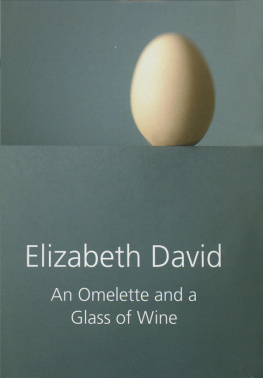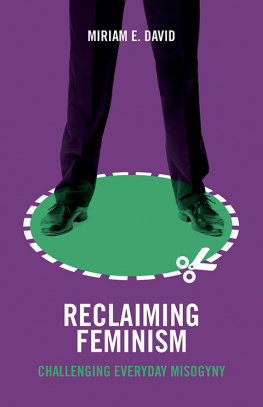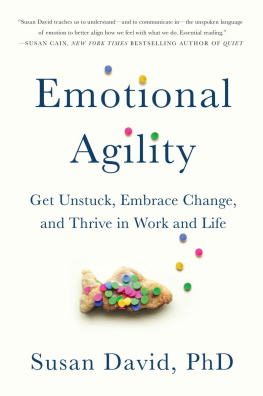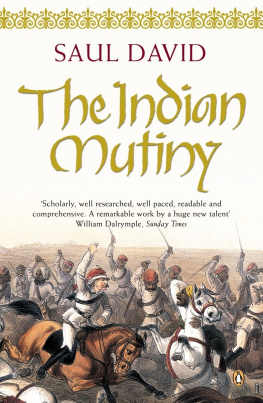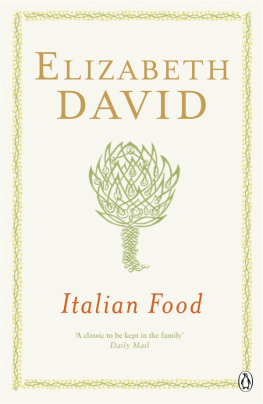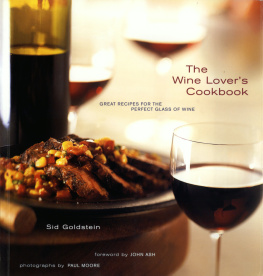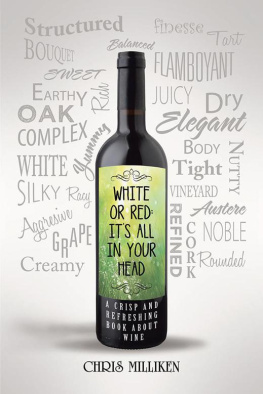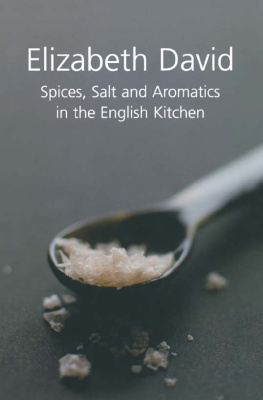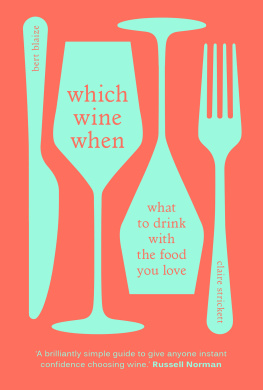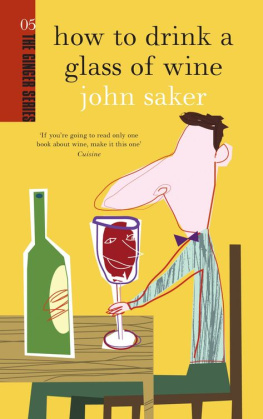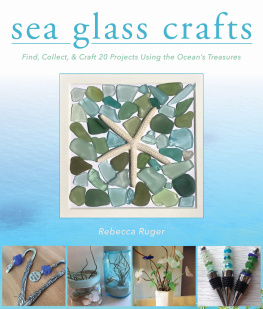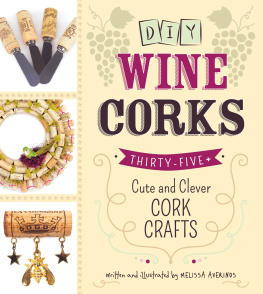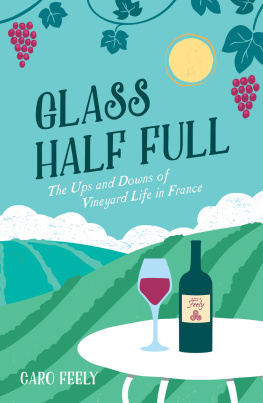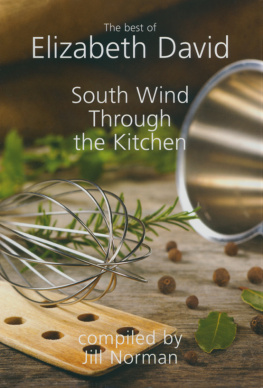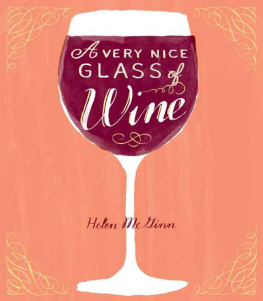Other books by Elizabeth David published by Grub Street
Elizabeth David Classics: Mediterranean Food,
French Country Cooking and Summer Cooking
Three works in one omnibus hardback edition
Spices, Salt and Aromatics in the English Kitchen
French Provincial Cooking
This edition published in 2009 by
Grub Street
4 Rainham Close
London
SW11 6SS
Email: food@grubstreet.co.uk food@grubstreet.co.uk
Web: www.grubstreet.co.uk
Reprinted 2005, 2008, 2011, 2013
Copyright this edition Grub Street 2009
Text copyright Elizabeth David, 1952, 1956, 1957, 1958, 1959, 1960, 1961, 1962, 1963, 1964, 1965, 1966, 1967, 1968, 1969, 1973, 1979, 1980, 1984, 2009
Drawings by Marie Alix for 107 Recettes de Curiosits Culinaires
Edited by Paul Poiret, published by Henri Jouquires et Cie, Paris 1928
A CIP record for this title is available from the British Library
ISBN 978-1-906502-35-5
All rights reserved. No part of this book may be reproduced or transmitted in any form or by any means, electronic or mechanical, including photocopying, recording or any information storage and retrieval system, without permission in writing from the publisher.
Printed and bound in India by
Replika Press Pvt. Ltd.
FOR
ANTHONY AND CELIA DENNEY
WITH LOVE
Contents
Illustrations
Elizabeth David in her kitchen, by John Ward, R.A.
In thirty five years of writing about food and cookery I have contributed articles to a very various collection of publications. From the Sunday Times to Nova, from Vogue to the Spectator, from the long defunct travel magazine Go to Cyril Rays Compleat Imbiber, Peter Dominics Wine Mine and quite a few others, I have put together the present volume. The bulk of the articles included were written during the decade between 1955 when I joined the Sunday Times as cookery contributor and 1965 when I launched my kitchen shop. For several of those years I was contributing a monthly article apiece to Vogue and House and Garden as well as a fortnightly one to the Sunday Times, and in 1960 had published French Provincial Cooking. In 1961, freed from the Sunday Times and the monthly stints for the Cond Nast magazines, I worked for a time for the moribund Sunday Dispatch and wrote my first contribution for the Spectator and, unexpectedly perhaps, thoroughly enjoyed writing for both publications. What matters is sympathetic editors who know how to get the best out of their contributors, and in that respect I have been, albeit with one or two notable exceptions, very fortunate.
It was the Spectators editors who liberated me from the strait-jacket of the conventional cookery article as decreed by custom. The old routine had been to open with a short introductory piece relevant to the products of the season, or to one particular type of dish, let us say souffls, omelettes, rice dishes the very first cookery article I ever wrote was for Harpers Bazaar and was called Rice Again or it might deal with the cookery of a specific region of France, or of Italy, or perhaps it would be a little moan about the poor quality of our potatoes, or about not being able to buy courgettes. Whatever it was, once the opening piece was dutifully concluded, you filled the rest of your space with appropriate recipes and that was that. Sometimes the formula reminded me of English musical comedy. The recipes were the turns, the songs and dances, the introductory pieces the spoken dialogue which kept the flimsy plot moving. It was all very stilted. When in 1956 I was recruited by Audrey Withers, editor of Vogue, to write for the Cond Nast magazines, I made a bid to break away from the idiotic convention by planning, for House and Garden, a series on English cookery and even Longmans, her own publishers, had never heard of her I followed up with Colonel Kenney Herbert, the Victorian officer who in his retirement opened a cookery school in Sloane Street, and copies of whose books on what in his opinion were the proper food and cooking for the British in India are today much sought after. In 1984 the subject is popular enough, but in 1956 the editors of House and Garden didnt take to the Colonel or the parade-ground tones in which he denounced the kitchens and cooks of the Raj. House and Garden readers, they said, wanted recipes, not history. It was back to the outdated formula.
For the temporary setback I made up during my years at the Spectator. They were stimulating years for me. Well, look at the company I found myself in. Katharine Whitehorn, Cyril Ray, Bernard Levin calling himself Taper, Alan Brien, Jean Robertson contributing a weekly piece under the pseudonym of Leslie Adrian. Brian Inglis was my first editor, succeeded by Iain Hamilton, in whose time most of my Spectator pieces were written, and at the end, briefly, the lamented Ian McLeod. If life as a contributor to the Sunday Times had been bumpy, and it had been made so by the late Ernestine Carter, editor of the fashion pages, always appropriately ready with her cutting-out shears when it came to my cookery pieces, at the Spectator, the co-operation, support and on occasions most beneficial editing by Cyril Ray and Katharine Whitehorn, were compensation for the years of Mrs Carters busy scissors. As can be seen from the selection of articles I have chosen to reprint (others have already been incorporated into books, some simply werent good enough to reproduce, some, including the historical ones, will eventually appear in another volume) my subjects were in the main topical, and ranged all over the place, from reviews of eccentric books such as Sir Harry Lukes The Tenth Muse and Alan Davidsons very singular first version of Mediterranean Seafood, then entitled Seafish of Tunisia and the Central Mediterranean, a stencilled production sold for the benefit of the Tunisian Red Crescent no doubt copies are now collectors items to harmless fun at the expense of restaurant guides and the baiting of public relations persons who made imbecile suggestions to the effect that two tins of tomato juice packed in a basket tied with red ribbons would make a nice neighbourly Christmas gift. Sometimes my fortnightly column would deal with an event such as a delicatessen exhibition, an encounter with some delicious and hitherto unknown wine or with a particularly awful restaurant, or even just with a glut of apples. Topics such as the well-known British disregard for the authenticity of other peoples and indeed our own culinary specialities preoccupied me a good deal, as how should they not? It has to be remembered that it was only in 1954 that we had been freed from food rationing. The national fling with abundance didnt occur overnight, and it didnt by any means coincide with an instant disappearance of all the ghastly synthetic foodstuffs and ignoble substitutes to which as a nation we had become acclimatised during the war years and after. On the contrary, once entrenched, those boil-in-the-bag sauces I wrote about in a little article for Punch, included in the present collection, and other such expedients of scarcity, whether of ingredients, time, technical accomplishment, or simply of knowledge, are still with us today, and given the microwaves magic button, likely to remain so. I think that blithe acceptance of travesty in the matter of imported specialities, whether it be the pizza, the quiche, or the newest invention of M. Michel Gurard, is deep within our national temperament. This characteristic I examined in an article about mayonnaise entitled

